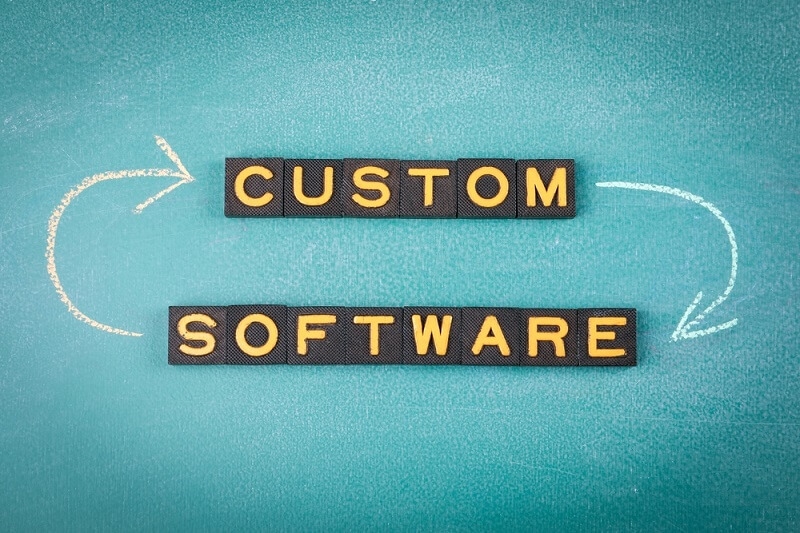
In the rapidly converging world of digital business in 2025, companies will soon learn about the limitations of off-the-shelf software. As competition and customer demand increase, organizations are demanding custom software to survive the challenges of competitive forces. The automation of manual processes, expansion without clutter, or consolidation of business-critical systems are only some of the reasons why custom software is the backbone behind the formation of sustainable growth.
This article explains how custom software solutions inspire business growth in 2025, specifically for U.S. start-ups, mid-size businesses, and enterprises. We will discuss in-depth the general advantages of custom software and how custom software puts points on the board at scale and with flexibility to show readers why and how this category-defining investment is becoming non-negotiable.
Custom software solutions are applications built and developed to fit your business's needs and challenges. While off-the-shelf software enables you to perform standardized and generic functionality, custom-built systems can be built around a company's unique workflows, customer needs, and growth ambitions.
As we move into 2025, we have embraced custom software solutions with scale; we attribute this rise to better development frameworks, cost-effective cloud infrastructure, and the growth of several software development companies in the U.S. that are focused on delivering cost-effective, high-quality solutions.
Generic software is cheap up front, but it stunts growth. Let me explain the difference between custom and off-the-shelf software according to primary business needs:
| Feature | Off-the-Shelf Software | Custom Software Solutions |
| Functionality | Generalized | Tailored to business needs |
| Scalability | Limited | Fully scalable |
| Integration | Often restricted | Seamlessly integrates |
| Security | Standard | Custom, enhanced protocols |
| User Experience | Broad design | Personalized UX/UI |
The takeaway? Tailor-made software tools don’t just support business processes—they elevate them.
When software mirrors how your team operates, productivity soars, custom solutions eliminate redundant tasks, reduce manual errors, and enable real-time collaboration, whether you’re managing inventory, customer relations, or project timelines. Bespoke platforms cut through the clutter.
Example: A retail business with unique warehousing requirements might develop a scalable software platform that automatically tracks seasonal stock movement, integrates with POS systems, and generates sales forecasts.
In 2025, customers expect fast, personalized, and seamless service. With custom software solutions, companies can design portals, apps, or dashboards that cater to specific user journeys. Everything, from personalized dashboards to tailored notifications, can be optimized for retention and satisfaction.
Custom solutions enable centralized access to business intelligence. Unlike fragmented systems, they pull data from multiple sources and present it in visual, actionable formats. Business leaders can respond faster to market changes, customer feedback, or internal inefficiencies.
Unlike generic tools that may lag or break under pressure, scalable software platforms are built with growth in mind. Your custom software grows with you as business needs evolve—whether through more users, bigger data loads, or new operational branches.
While enterprises have long embraced tailored systems, 2025 marks a pivotal moment for software for small business operations. Here's why smaller firms are increasingly investing in custom development:
For example, a boutique travel agency may deploy a custom CRM that handles client itineraries, vendor communications, and feedback loops from one dashboard.
Medical practices leverage secure, HIPAA-compliant software to manage electronic health records, automate patient reminders, and streamline billing.
From personalized shopping experiences to inventory automation, tailor-made platforms enhance everything from customer engagement to logistics.
Custom software solutions ensure compliance with regulatory standards while automating claims, underwriting, and customer support tasks.
Firms are integrating IoT devices with production management software to monitor machinery, optimize workflows, and reduce downtime.
Institutions now create custom learning management systems that adapt to student learning styles and integrate virtual classrooms with administrative tools.

Let's break down the benefits of custom software that directly contribute to measurable growth:
Custom solutions align closely with your objectives. Whether cutting costs, improving efficiency, or launching a new product line, the software serves your specific goals.
Though initial costs may be higher than SaaS subscriptions, the long-term savings are significant. You avoid monthly licensing fees, expensive add-ons, and productivity losses.
U.S. businesses will face growing cybersecurity threats in 2025. Custom tools can be developed with multi-layer encryption, role-based access, and compliance-specific protections.
A core advantage is integration with third-party services—from accounting to analytics—all working harmoniously.
With proprietary software, you own your data. This means better privacy compliance and flexibility in data use or sharing.
As demand for tailored digital tools skyrockets, U.S. software development firms are stepping up. Their services now cover:
Whether it's a Texas-based logistics company or a New York-based fintech startup, local development firms are helping businesses go beyond plug-and-play solutions to create meaningful digital transformation.
Automation is no longer optional. In 2025, companies are embedding intelligent workflows into tailor-made software tools, allowing machines to handle everything from approvals to customer follow-ups.
AI-powered custom systems can:
This frees up time, increases accuracy, and accelerates decision-making—all vital ingredients for growth.
Like any strategic investment, custom software does come with challenges:
Initial development costs can be higher, but precise ROI calculations and phased rollouts help businesses stay within budget.
Building custom software takes time, unlike building off-the-shelf tools. The solution: Agile development with sprints and early testing ensures faster time-to-value.
Companies should ensure proper documentation, code ownership rights, and open-source technologies when possible to avoid being overly reliant on one developer.
You might need custom software if:
If any of the above sounds familiar to you, it's time to explore a tailored solution.
In 2025, custom solution software will no longer be a technical advantage but a business strategy. Custom software is increasingly following suit through operational efficiencies, improved customer satisfaction, data-driven decisions, and scaling to support growth. Hence, it's no wonder that custom platforms will form the backbone of successful businesses in the future.
Whether you are a small business owner or the CTO of a growing organization, directing your investment no longer just toward software systems used to support your operations but toward scalable software platforms supporting those systems is no longer simply a sound business choice; it's a requirement. As competition heats up and automation grows in every industry, having the proper digital foundation could mean the difference between growth and stagnation.
Instead of just adapting to 2025, aim to build for it with custom software that is as ambitious as your business ambitions.
This content was created by AI